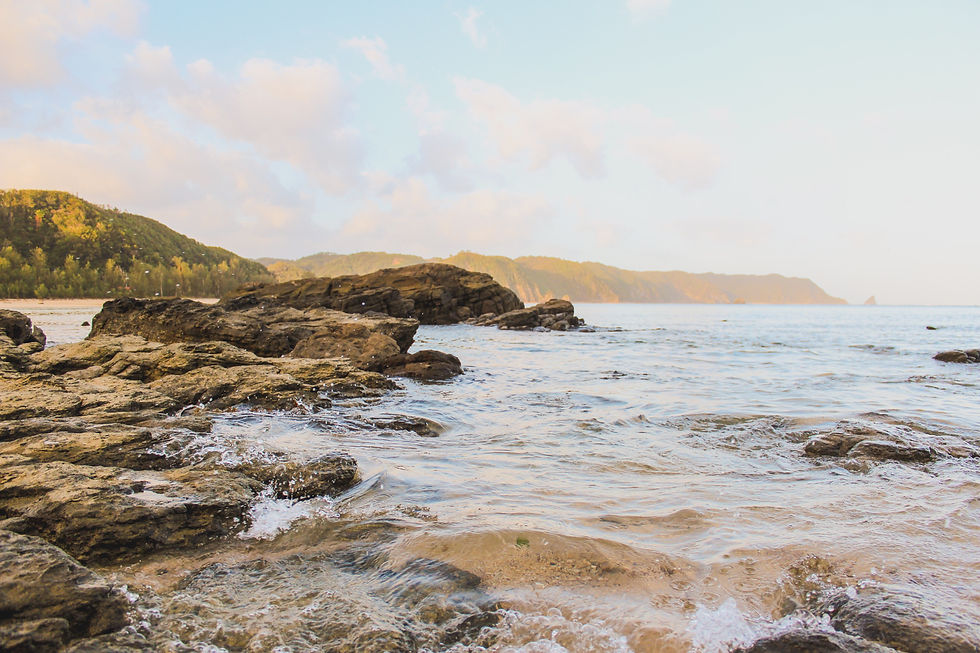Why I Care About Our Oceans
- Allie
- Jun 19, 2019
- 3 min read
Updated: Jun 20, 2019
This is the first blog post in a series on ocean conservation.

The health of our oceans is something that has become very near and dear to my heart since we moved to Okinawa. It's not that I didn't care before, but since living in this part of the Pacific, the issues can't be ignored. It smacks you in the face every time you walk down to the beach. And unless you've been living under a rock then you've probably started to hear people talking about it more, seen more documentaries and read more news clips. If you haven't noticed that's ok! Now is the time to open your eyes to the state of our oceans.
Water covers three-fourths of our planet and it is a provider and sustainer of life. The ocean provides over half of the world's oxygen! It also contains 50 times more carbon dioxide than our atmosphere! The ocean is vitally important to the air we breathe. The oxygen you breathe doesn't only come from plants and the photosynthesis process. Plankton, seaweed and other marine plants make food for themselves which then releases oxygen into our atmosphere. It is such an incredible, delicate and totally fascinating cycle.
Climate change is one of those sticky subjects that no one can seem to agree on. (Trust me, I'm so not going there with this blog post!) Some people don't think it's a real thing and some people don't buy into it at all. But take a look at our oceans, and it's easy to see that we've got a HUGE problem with plastic pollution. Every time I walk down to the little beach near our home (no more than a 600 meter stretch of beach) there is trash. And I'm not talking about an issue with locals or tourists leaving trash behind. This trash is being washed up from whoknowswhere out in the Pacific. Our little village does quarterly clean-ups and some of us take a trash bag to fill when we go to the beach. There's no way around it, plastic and trash in our oceans is seriously taking a toll on our environment.

Trash on beaches isn't a localized issue. Beaches on remote atolls are being covered in trash and birds are washing up dead with bellies full of plastic. It has been estimated that 8 million metric tons of plastic waste make their way into the ocean each year. That's a mind-boggling huge number but broken down further it equals one garbage truck full of trash being dumped into the ocean every minute of every day for a year. Phew! Eighty percent of that trash is thought to come from land-based activities.
The Popular Science Magazine released their Summer 2019 issue and they jump into the issue of plastics. The facts throughout the magazine can't be ignored. "Plastic is permanent. It can take a thousand years to break down, and even then it's usually just breaking into smaller and smaller pieces, never becoming soil in the way a paper, cotton, or compostable bioplastic would. Eventually, it becomes tiny particles, or microplastics, which are increasingly a health and environmental concern. Last week, scientists reported that microplastics are accumulating deep in the ocean—not just floating on the surface—and that these particles were largely derived from single-use plastics."

There are even huge garbage patches floating in the ocean that have been named and mapped. The Great Pacific Garbage Patch in the North Pacific Ocean spreads from the West Coast of North America to Japan. Sadly this isn't a new issue our oceans are facing. In 1999 Capt. Charles Moore decided to go where few seafarers dared to cross and took a shortcut through the Great Pacific Garbage Patch. In 2003 he told the Natural History magazine "As I gazed from the deck at the surface of what ought to have been a pristine ocean, I was confronted, as far as the eye could see, with the sight of plastic. It seemed unbelievable, but I never found a clear spot. In the week it took to cross the subtropical high, no matter what time of day I looked, plastic debris was floating everywhere: bottles, bottle caps, wrappers, fragments." When you start researching this issue even further it can be quite depressing.
Are you wondering yet what you can do to help? I know not everyone will have the opportunity to live on a tropical island and experience this for themselves. There are plenty of ways you can educate yourself and then in turn help spread the word about this issue. In my upcoming blog posts in this series I will provide resources for education and tangible things you can start doing today to help!
You can find the second post in this series here.






Comments